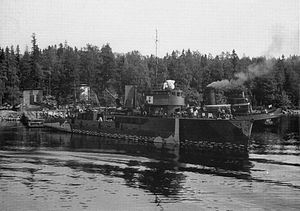Ruotsinsalmi-class minelayer
 Riilahti
| |
| Class overview | |
|---|---|
| Name | Ruotsinsalmi class |
| Succeeded by | Keihässalmi |
| In service | 1941–1975 |
| Completed | 2 |
| Lost | 1 |
| Scrapped | 1 |
| General characteristics | |
| Type | Minelayer |
| Displacement | 310 tons |
| Length | 50 m (164 ft 1 in) |
| Beam | 7.9 m (25 ft 11 in) |
| Draught | 1.5 m (4 ft 11 in) |
| Propulsion | |
| Speed | 15 knots (28 km/h; 17 mph) |
| Sensors and processing systems | Hydrophones |
| Electronic warfare & decoys | Decoy: Smoke generators |
| Armament |
|
The Ruotsinsalmi-class minelayers were a two-strong class of minelayers in the Finnish Navy.
Both ships were launched in 1940 and named after famous 18th-century sea battles between Sweden and Russia.
Funding for two new minelayers had been secured as early as in 1937, but instead the money was used to refurbish the garrison at Mäkiluoto. Riilahti was launched on December 14, 1940, three weeks after her sister ship Ruotsinsalmi.
The vessels differed somewhat, Riilahti having an extensively modified propulsion system and hull, compared to its sister vessel.
Originally, the vessels were intended as escort minesweepers for the Finnish Navy's coastal defence ships Ilmarinen and Väinämöinen, and they were therefore designed with a draft of only 1.5 metres (4 ft 11 in). The ships were armed with one 75 mm (3.0 in) gun, one Bofors 40 mm (1.6 in) guns and two Madsen 20 mm (0.79 in) anti-aircraft cannon. The vessel had three mine dropping rails, and could carry about 100 mines. The ship could also hunt submarines, and was equipped with hydrophones, depth charge throwers and rails. The vessel was also strong enough to be able to tow minesweeping equipment. It was equipped with smoke generators so it could protect itself, and other near-by vessel from enemy vessels.
